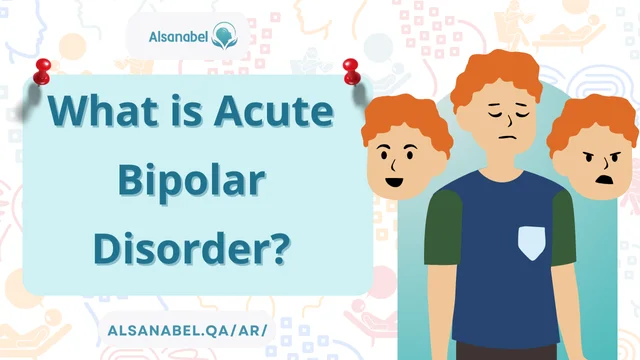
Bipolar disorder is a complex mental health condition characterized by extreme mood swings, ranging from manic highs to depressive lows. When these mood episodes become severe and disruptive, they are often referred to as acute bipolar disorder. Understanding acute bipolar disorder is crucial for effective management and treatment. This article delves into the symptoms of acute bipolar disorder, how it is diagnosed, and the various treatment options available. Additionally, we will explore how to manage acute bipolar episodes, providing valuable insights for individuals, caregivers, and healthcare professionals. By the end of this article, you will have a comprehensive understanding of acute bipolar disorder and the strategies to address it effectively.
What is Acute Bipolar Disorder?
To begin understanding acute bipolar disorder, it’s essential to define what it means in a clinical context. Acute bipolar disorder refers to severe episodes of mania, hypomania, or depression that significantly impair an individual’s ability to function in daily life. These episodes are often intense and may require immediate medical attention.

Key Characteristics of Acute Bipolar Disorder
- Severity: Symptoms are more intense and disruptive than in milder episodes.
- Duration: Acute episodes can last for days, weeks, or even months if untreated.
- Impact: These episodes often lead to significant impairment in social, occupational, or other important areas of functioning.
Types of Acute Episodes
- Acute Mania: Characterized by elevated mood, increased energy, and impulsive behavior.
- Acute Hypomania: A milder form of mania that is less severe but still noticeable.
- Acute Depression: Marked by intense sadness, hopelessness, and loss of interest in activities.
Symptoms of Acute Bipolar Disorder
The symptoms of acute bipolar disorder vary depending on the type of episode. Below, we explore the symptoms associated with acute mania, hypomania, and depression.
Symptoms of Acute Mania
- Elevated Mood: Feeling excessively happy, euphoric, or irritable.
- Increased Energy: A surge in activity levels and restlessness.
- Risky Behavior: Engaging in impulsive actions, such as excessive spending or reckless driving.
- Reduced Need for Sleep: Feeling rested after only a few hours of sleep.
- Grandiosity: Inflated self-esteem or belief in one’s abilities.
Symptoms of Acute Hypomania
- Mild Elevation in Mood: Similar to mania but less severe.
- Increased Productivity: Heightened creativity and focus.
- Social Engagement: More talkative and outgoing than usual.
Symptoms of Acute Depression
- Persistent Sadness: Feeling hopeless, empty, or tearful.
- Loss of Interest: Lack of pleasure in activities once enjoyed.
- Fatigue: Low energy and constant tiredness.
- Sleep Disturbances: Insomnia or excessive sleeping.
- Suicidal Thoughts: In severe cases, thoughts of death or suicide.
Diagnosing Acute Bipolar Disorder
Diagnosing acute bipolar disorder requires a thorough evaluation by a mental health professional. The process typically involves the following steps:
Clinical Interview
- Symptom Assessment: Discussing the nature, duration, and severity of mood episodes.
- Medical History: Reviewing past mental health issues and family history.
Diagnostic Criteria
- DSM-5 Guidelines: Using the Diagnostic and Statistical Manual of Mental Disorders to confirm the diagnosis.
- Rule Out Other Conditions: Ensuring symptoms are not due to another medical or psychiatric condition.
Additional Assessments
- Mood Charts: Tracking mood swings over time.
- Psychological Tests: Evaluating cognitive and emotional functioning.
Treatment Options for Acute Bipolar Disorder
Effective treatment for acute bipolar disorder often involves a combination of medication, psychotherapy, and lifestyle changes. Below, we explore the most common treatment options.
Medications
- Mood Stabilizers: Lithium is the most commonly prescribed mood stabilizer.
- Antipsychotics: Used to manage manic or mixed episodes.
- Antidepressants: Prescribed cautiously, often in combination with mood stabilizers.
Psychotherapy
- Cognitive-Behavioral Therapy (CBT): Helps individuals identify and change negative thought patterns.
- Interpersonal and Social Rhythm Therapy (IPSRT): Focuses on stabilizing daily routines and improving relationships.
- Family-Focused Therapy: Involves family members in the treatment process to provide support.
Lifestyle Changes
- Regular Sleep Schedule: Maintaining consistent sleep patterns to prevent episodes.
- Stress Management: Techniques like mindfulness, meditation, and exercise.
- Healthy Diet: Eating a balanced diet to support overall well-being.
Managing Acute Bipolar Episodes
Knowing how to manage acute bipolar episodes is crucial for individuals and caregivers. Below, we outline strategies for managing acute mania, hypomania, and depression.
Managing Acute Mania
- Immediate Intervention: Seek medical attention if the individual is at risk of harming themselves or others.
- Medication Adjustment: Adjusting or starting mood stabilizers and antipsychotics as prescribed.
- Safe Environment: Removing access to potentially harmful items and ensuring a calm, supportive environment.
Managing Acute Hypomania
- Monitoring Symptoms: Keeping track of mood changes and behaviors.
- Therapy: Engaging in CBT or IPSRT to address symptoms.
- Lifestyle Adjustments: Maintaining a regular routine and avoiding triggers like stress or substance use.
Managing Acute Depression
- Safety Planning: Ensuring the individual has a support system and access to emergency resources.
- Medication: Starting or adjusting antidepressants under medical supervision.
- Therapy: Participating in CBT or other forms of psychotherapy to address depressive symptoms.
Frequently Asked Questions

What does “acute bipolar disorder” mean in a clinical context?
Acute bipolar disorder refers to severe episodes of mania, hypomania, or depression that significantly impair an individual’s ability to function in daily life.
How are acute episodes of bipolar disorder identified?
Acute episodes are identified through clinical interviews, symptom assessment, and diagnostic criteria outlined in the DSM-5.
What immediate interventions are recommended during an acute episode?
Immediate interventions may include seeking medical attention, adjusting medications, and ensuring a safe and supportive environment.
Can acute episodes require hospitalization?
Yes, severe acute episodes, particularly those involving mania or suicidal thoughts, may require hospitalization to ensure safety and stabilization.
How do treatment strategies differ during acute phases?
During acute phases, treatment often focuses on stabilizing the individual through medication adjustments, therapy, and creating a safe environment. Long-term strategies may include ongoing medication, therapy, and lifestyle changes.
By understanding acute bipolar disorder and knowing how to manage acute bipolar episodes, individuals and caregivers can take proactive steps to address this challenging condition. Whether through medication, therapy, or lifestyle adjustments, effective management is possible. This comprehensive guide provides valuable insights into the symptoms of acute bipolar disorder and the strategies to address it effectively, offering hope and practical solutions for those navigating this complex condition.
